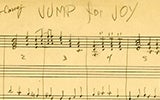
The exhibition Duke Ellington on Stage and Screen is open in the Leon Robbin Gallery in the Booth Family Center for Special Collections.
Edward Kennedy “Duke” Ellington (1899–1974) was one of the most prominent musical figures of the 20th century. His music was often defined as “jazz,” but he sought to create a body of music “beyond category.” In fact, he preferred to be called simply an “American” composer. The breadth of Ellington’s output was astounding. In addition to writing hundreds of jazz standards, including “Mood Indigo” and “Don’t Get Around Much Anymore,” he served as the leader of America’s most stellar big band for nearly a half century and composed numerous film scores, musicals and large-scale orchestrated works. Even more importantly, he was one of the most prominent public figures in American history.
Born and raised in Washington, DC, Ellington moved to New York in 1923, where he soon gained national prominence as the featured performer of Harlem’s famous Cotton Club. In 1920s New York, Ellington was drawn to the socially-conscious, artistic flowering commonly referred to as the Harlem Renaissance. He was especially drawn to the work of Langston Hughes, who in his 1926 essay “The Negro Artist and the Racial Mountain” described jazz as “one of the inherent expressions of Negro life in America: the eternal tom-tom beating in the Negro soul – the tom-tom of revolt against weariness in a white world.” Ellington took this statement to heart when, in the 1930s, he made his way to Hollywood. This exhibition focuses on some of Ellington’s earliest experiences as a composer for stage and screen, and his desire to serve as an artist promoting “the inherent expressions of Negro life in America.”
Original manuscripts, photographs and ephemera in the exhibition are selected from the Arthur Johnston Papers, the Martin J. Quigley Papers and The Leon Robbin Collection of Music Manuscripts and Letters of Composers in the Booth Family Center for Special Collections. The exhibition was curated by Prof. Anna H. Celenza, Thomas E. Caesteker Professor of Music and Gaelle Pierre-Louis (SFS'2017). Open hours are 9 a.m. to 5 p.m., Monday through Friday.
